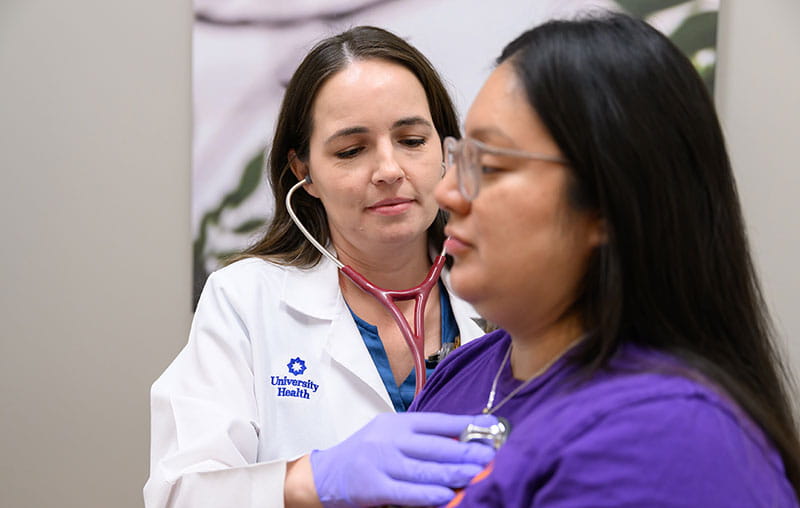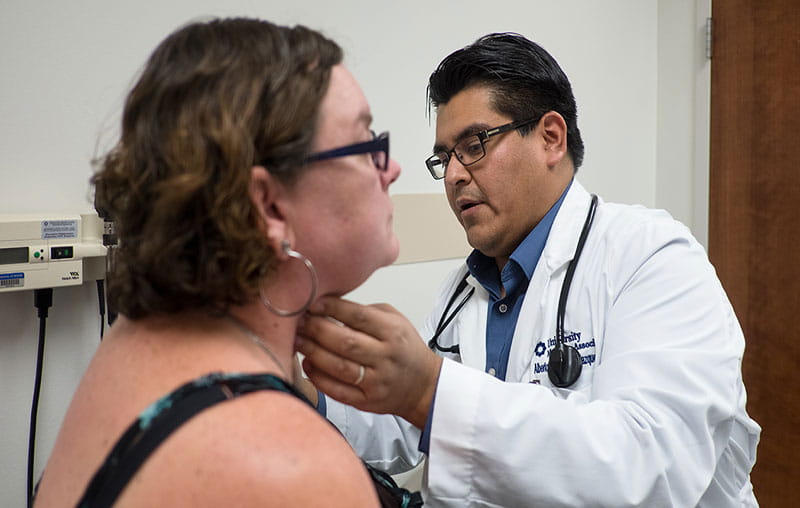For years, you’ve probably heard menopause described as “the change of life.” Maybe your mom or friends have shared stories about hot flashes or mood swings, but how much do you really know about this time of transition?
If you’re approaching menopause, you’re not alone. According to the National Institute on Aging, more than 1 million women in the U.S. reach menopause each year.
Even though it’s universal, this transition can bring a mix of physical, emotional and cognitive changes. To help ease your mind, Dr. Erin Mankus, an OB/GYN with University Health, explains what to expect during the three stages of menopause and how today’s understanding of hormone therapy offers safer, more personalized care than ever before.
The Three Stages of Menopause
When people talk about menopause, they often use one word to describe what is actually a gradual, multi-stage transition as estrogen and progesterone levels decline.
“Menopause isn’t one single moment. It’s a spectrum of changes your body goes through as it shifts out of the reproductive years,” explains Dr. Mankus.
The three stages include:
Perimenopause
This phase usually begins two to eight years before your final menstrual period, most often in your mid- to late-40s. Hormone levels fluctuate unpredictably, causing irregular cycles and a range of symptoms that may include:
- Hot flashes or night sweats
- Sleep disruption or fatigue
- Mood changes or brain fog
- Vaginal dryness or discomfort with intercourse
- Increased urinary tract infections or leakage
Because ovulation can still occur, pregnancy remains possible until you’ve gone 12 months without a period.
Menopause
Menopause is a single point in time. It is the date marking 12 consecutive months without menstruation. The average age in the U.S. is 51, though it can happen earlier or later.
If menopause occurs before age 40, it’s called premature or early menopause.
“After menopause, any vaginal bleeding should be evaluated by your clinician,” Dr. Mankus says.
Postmenopause
Postmenopause begins the moment you hit menopause. “Once you’ve gone 12 months without menstruation, you’re in postmenopause,” said Dr. Mankus.
During this phase, estrogen deficiency contributes to long-term changes in bone density, cholesterol and cardiovascular health, so it’s a good time to review your preventive care plan.
Talk with your medical provider about your personal risk of conditions that become more common during postmenopause, such as heart disease, stroke and osteoporosis.
Understanding Menopausal Symptoms
Symptoms differ widely. Some individuals barely notice changes; others experience hot flashes or sleep loss that significantly affect quality of life. The broad range of possible effects come from the multiple body systems affected by drops in estrogen, including your vasomotor, urogenital, skeletal and cardiovascular systems.
“Everyone experiences menopause uniquely. Understanding what’s normal and what’s treatable can make a tremendous difference,” says Dr. Mankus.
Managing Menopause Symptoms
For decades, hormone therapy has been the most effective treatment for hot flashes, night sweats and vaginal dryness. But confusion following the early-2000s Women’s Health Initiative (WHI) results led many women (and clinicians) to avoid treatment altogether.
Current research, however, provides a more refined view:
- The WHI studied older women who mostly did not have symptoms and used hormone types that are no longer the standard treatment today.
- Today’s therapy uses bioidentical hormones—estradiol and micronized progesterone—that act more like the body’s natural hormones and have different safety effects.
- When started within 10 years of menopause or before age 60, estrogen therapy may lower the risk of heart disease, osteoporosis and death from any cause, without raising the risk of dying from breast cancer.
Types of Hormone Therapy Available
- Estradiol-17β (oral, patch or gel): identical to the body’s own estrogen, effectively treats hot flashes, night sweats and vaginal dryness while maintaining bone density.
- Micronized progesterone: protects the uterine lining and has not been linked to increased clotting or breast cancer risk.
- Low-dose vaginal estrogen: safe and effective for vulvovaginal dryness and urinary discomfort, even for many women with a history of breast cancer when used under shared decision-making
Other Ways to Manage Menopause Symptoms
Non-hormonal options are also available, as well as changes to your lifestyle may also be beneficial.
Lower estrogen levels are associated with a higher risk of serious medical conditions, including heart disease and stroke. Exercising regularly, losing weight if necessary and eating a balanced diet can help you lower that risk and protect your health.
A Personalized Approach
The key message from Dr. Mankus is to talk with your OB/GYN or a women’s health provider about what you’re experiencing and how you can minimize menopause symptoms, including hormone therapy.
Hormone therapy isn’t one-size-fits-all. Different therapies and doses have unique effects and the safest approach depends on your age, health history and goals.
“Our understanding of hormone therapy has evolved. When prescribed thoughtfully, estradiol and progesterone can safely relieve symptoms and help preserve bone and heart health for many women,” says Dr. Mankus.
Women’s Health at University Health
You can navigate menopause with comfort and confidence. Schedule an appointment with one of our women’s health specialists and talk to them about your concerns and options, including whether hormone therapy is appropriate for you.
Have questions about the menopausal transition? Schedule an appointment with our women’s health specialists.





